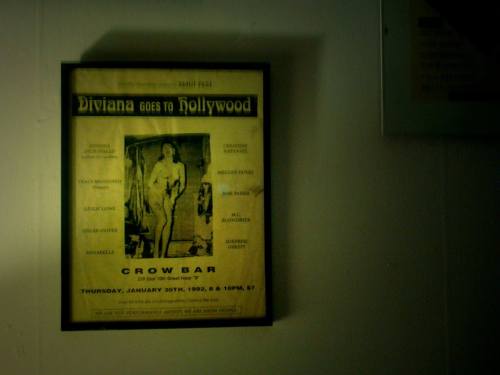
Tonight, Julien was up late, lying back on the sofa in the living room watching Hayao Miyazaki’s film, My Neighbor Totoro; Maggie was upstairs, looking up information about bunny rabbits on the computer upstairs; Heather was sitting next to Julien, typing on her laptop at work on her novel; and I was lying back on the love seat across from Heather and Julien, reading a passage from Haruki Murakami’s Hard-Boiled Wonderland and the End of the World, when I remembered a time nearly fifty years ago.
My brother Tony and I were with my parents at Sears or maybe it was the old Hecht Co. in downtown DC, and they were buying either a major appliance or a large piece of furniture. Whatever it was, it was something big and important. The transaction was done, and arrangements had been made for delivery of the appliance or piece of furniture, and my Mom or Dad, in saying goodbye to the salesman, asked him what his name was. The salesman, I remember, was a balding, pudgy, middle-aged man, who suddenly stood up a little straighter, a little taller, and gave his head a proud tilt as he announced to my Mom and Dad his wonderful name—“Irving Berlin.”
“Really?” they asked?
“Yes, yes,” he replied, then said it again with pride. “My name is Irving Berlin.”
They were impressed. I was impressed, too, though I was only vaguely aware of Irving Berlin as a renowned songwriter and composer, the man responsible for songs like “White Christmas” and “There’s No Business Like Show Business.” I also thought that this wasn’t simply a man who shared a name with the famous songwriter, but that this actually was the famous songwriter, and that this was what, as a grown up, he did—write songs, and sell furniture.
And maybe it was furniture, and not a major appliance that my parents were buying. Because what triggered this memory was my reading a passage from one of the Hard-Boiled Wonderland chapters in which the narrator talks about sofas—specifically, how “you can tell a lot about a person’s character from his choice of sofa.” And, “there are people who drive luxury cars, but have only second- or third-rate sofas in their homes. I put little trust in such people.” Although the narrator from the novel is an oddball, it was a passage I could really feel. Or maybe that’s exactly why I could feel it—because the narrator is an oddball.
And then I remembered last week, before we moved the television from the parlor to the living room. Julien was, again, watching My Neighbor Totoro, and the movie was just getting up to the part where the Dad and his two daughters are bathing when they hear the resident ghosts in their new house—the soot sprites—making noise upstairs. While watching this, Julien became alarmed. He walked over to the parlor door and tried to open it.
“Wait, wait,” I told him, knowing that things are soon all right again in the movie. At this point in the movie, the Dad starts laughing, and making funny faces; his daughters, who were at first scared, follow his example. With the Dad and his daughters laughing and making funny faces, the ghosts gather and, in one of the film’s most beautiful scenes, float up and away from the house. Watching this, Julien let his hand down from the parlor door, then started smiling.
“See, it’s OK,” I told him, and he moved back toward the middle of the room.
A couple of nights ago, I sat upstairs with Maggie until she finally fell asleep. She was worried. One of the teachers at her acting camp had told her how the theater is haunted, and sometimes they’ll hear a giggling ghost girl there late at night. Tonight, though, she’s focused on the possibility of having a bunny rabbit for a pet. I could tell Maggie the story about Harvey, the 1950 Jimmy Stewart film in which “Harvey,” the title character, is some sort of six foot tall ghost rabbit, but I’m not.
This photo shows a framed flyer, hanging in the parlor of our house, of an event I did over twenty years ago called, Smut Fest. The line at the bottom says, “We Are Not Performance Artists. We Are Show People.” And tonight I’m thinking that yes—like my childhood vision of an Irving Berlin who wrote his songs and also sold furniture—we are, indeed, show people.
-Jose Padua
